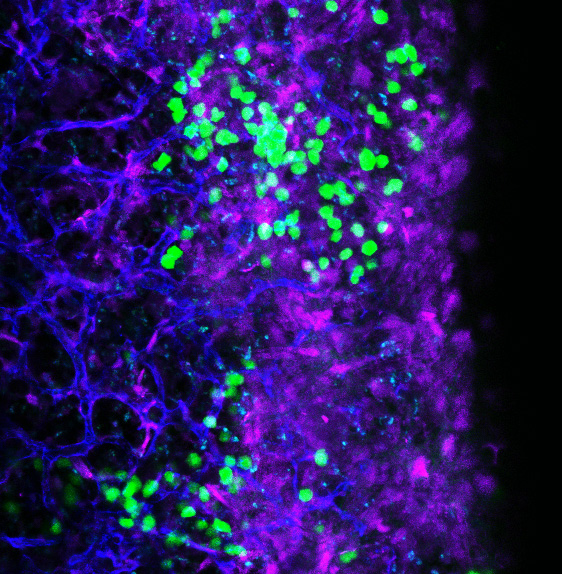
Identifying novel microenvironmental regulators of myeloid malignancies
Aggressive myeloid malignancies such as Acute Myeloid Leukemia (AML) and blast crisis Chronic Myeloid Leukemia are characterized by rapid and uncontrolled growth of immature cells of the myeloid lineage. Since current therapies are often ineffective in treating these diseases, there is a significant need to better understand mechanisms driving their progression, and to identify new therapeutic targets. While cell intrinsic factors that drive leukemia propagation are well described, little is known about the role of interaction of leukemia cells with their environment. In this context, our work has shown that adhesive interactions of leukemia cells with their niche, mediated via Tetraspanin3 (Kwon/Bajaj et al., Cell Stem Cell, 2015) and CD98 (Bajaj et al., Cancer Cell, 2016), play a critical role in promoting leukemic growth. To define the molecular effectors mediating the interactions between cancer cells and their environment, we have recently carried out a genome-wide in vivo CRISPR/Cas9 screen and identified genes critical for leukemic stem cell (LSC) growth and proliferation (Bajaj et al., Nature Cancer, 2020). We are now using this screen to characterize the functional role of novel cell surface genes, which can integrate signals from the environment, on the growth and progression of myeloid cancers. To establish relevance to human disease, we test the role of these signals on the proliferation and differentiation of primary human patient samples in xenograft models. We anticipate that these studies will establish the nature of cancer stem cell interactions with their niche during myeloid disease progression and may lead to the development of novel therapeutic approaches to manage aggressive disease.

Jeevisha Bajaj, PhD
Assistant Professor
Department of Biomedical Genetics
Wilmot Cancer Institute
University of Rochester Medical Center
585.276.7140
Jeevisha_Bajaj@urmc.rochester.edu
Affiliations
Department of Biomedical Genetics
Genetics, Development, and Stem Cells Ph.D. Program
Wilmot Cancer Institute
University of Rochester Medical Center




